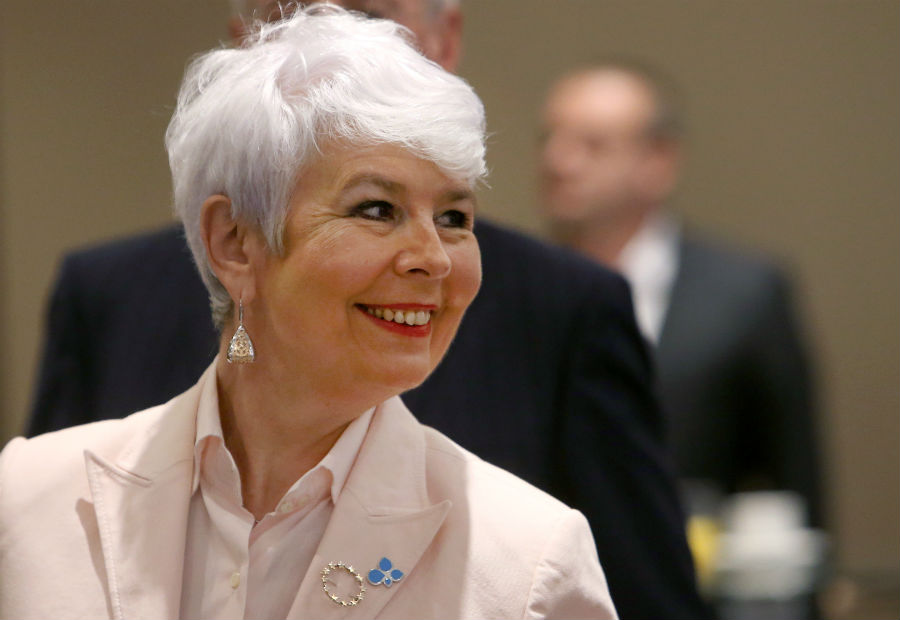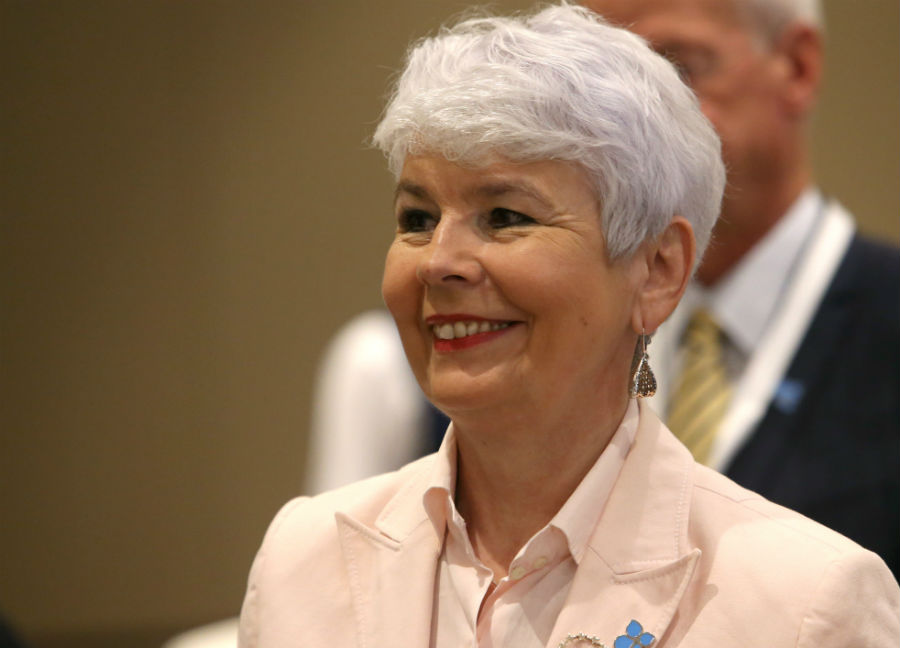When you are going through hard times, remember Croatia’s path to the EU

Jadranka Kosor was Croatia’s prime minister in the period between 2009 and 2011, when, after the resignation of the controversial Ivo Sanader, she succeeded the helm of the HDZ party. While serving as the head of the government in Zagreb, an agreement was reached to overcome the border dispute with Slovenia, which meant unblocking Croatia’s EU negotiations and their completion. For more than half a decade, Kosor has not been actively involved in Croatian politics, but has recently been activated in the Podgorica Club as a think-tank that includes former heads of state and government from the Western Balkans region. On this occasion, Kosor recently visited Skopje, from where the Podgorica club sent a message that the decision on the date for accession talks with our country will also be a test for the credibility of the EU.

What are you doing now, since you have not been actively involved in politics for several years now?
– Among other things, I’m writing a book precisely about the period when I came to the helm of the government in Croatia, during the period of unblocking and the conclusion of negotiations with the EU. I often travel around the world. You see that in less than a month I am visiting Macedonia – now North Macedonia – for the second time. In fact, I have not entirely given up politics. We’ll see, maybe I’ll have another appointment in the future.
So are you thinking of returning to politics?
-Yes, I am, because there are people who are trying to convince me of accepting various appointments. And politics is like that – once you get into it, once you get infected, it’s very hard to cure it.
Were you in Skopje during the visit of Pope Francis?
-Yes. I was there for a different reason, but I stayed because the Holy Father was visiting. I am very grateful to the Prime Minister Zoran Zaev for providing me with a seat in the first row so that I can watch the holy mass. That meant very much to me.
What does the Pope’s visit mean for North Macedonia?
-I think it is of great significance. The Holy Father is one of the world’s greatest authorities. A person who seeks to build bridges and connect, who constantly speaks of love and understanding between people and nations, speaks very clearly and precisely that we are all equal. Therefore, I think that, regardless of the small number of Catholics living in North Macedonia and Bulgaria, his desire to come is a great encouragement for your country, in particular for those who lead the country today on the European path. This is how I see it. Because the Pope is a statesman, and a creator of bridges and peace. And this is a great encouragement to all of you.
Did Croatia complete the accession talks with the EU during your term as prime minister?
– During my term, negotiations with the EU were first unblocked because when I came to the helm of the government, the negotiations were blocked. Slovenia has blocked Croatia’s accession talks. Then I completed the negotiations. Most of the chapters were opened and closed after I became prime minister. When I came to the helm of the government, out of the 35 chapters that Croatia had, only five were open. Thus, I completed a huge part of that big task, with the most difficult segments where the EU had the greatest expectations from us – the fight against corruption and crime, and the strengthening of the rule of law.
And then you lost the elections?
-Yes. My party HDZ, which I led, lost the elections because at the height of that fight against corruption, the former president of the government and former leader of the HDZ – Mr. Ivo Sanader was charged. Unfortunately, this trial against him and the party is still ongoing. In such circumstances, it is expected that the party would not win the elections. But despite all that, we achieved a solid result. However, the loss of the elections was a sufficient reason for some of my former party colleagues at that moment to decide that I had to leave the leader’s post, and then, with the arrival of the new leader, Tomislav Kramarko, they excluded me from the HDZ party.
You resolved the dispute with Slovenia, unblocked and completed the accession talks, and in the end you lost both the government and the party. Is it some kind of “curse” that a reform government should face?
– No, it’s not. I think it was my own personal fate. Personally, as a politician, that fierce and sincere fight against corruption has returned to me as a boomerang and politically beheaded me. But, I still think now as I did then – that the fight against corruption is particularly important for strengthening of human rights.
The fight against corruption is a fight for the “little” man, for business and economy. You cannot expect any larger foreign investments if there is a perception that corruption is blooming in your country. I thought it was the best I could do for my country, and I still think the same today. That’s why I think that it was about my own personal political fate, and the fact that I am a woman also helped to some extent.
Perhaps we cannot draw a full parallel, but the current Macedonian government has resolved the almost thirty-year-long dispute with Greece, which enabled the unblocking of the process of the country’s EU-Atlantic integration. What do you think, how will this affect Zaev’s government?
In a way, I compare what Zaev does with what I did. When I came to the helm of the government, the EC they me “if you settle the dispute with Slovenia you will continue the negotiations, if not, then you won’t. And no one in the EU or in the EC was interested in dealing with Croatia. Slovenia was a member state of the EU.
The situation is the same now. Greece blocked Macedonia over the name issue. And you succeeded with a lot of work and with a lot of patience to solve this issue with a new name for Macedonia and I think that this is a huge achievement. I think that Mr. Zaev and his Greek counterpart showed great courage, as I showed then, in cooperation with Mr. Borut Pahor. I think courage is the most important thing in politics. Only brave people can make decisions that they ultimately do not know how will end, and how they will affect their political life. That’s why I’m here today. I believe that you should encourage your government and prime minister to continue along that path. And, since I come from Croatia, I expect the Croatian authorities to clearly and unequivocally point out to the EC and the EU that North Macedonia has made great strides and deserves any kind of support.
At one time, Croatia and Macedonia were in the same package on the road to the EU and NATO, as members of the Adriatic Group. Now we have one empty walk of about ten years on the road to Brussels. Do you think that our country will be able to easily compensate for this lost time?
Anything is possible. We too have faced such situations. Croatia was the last one to join the EU, and was negotiating longer than the rest. When you are going through hard times, think of Croatia’s road to the EU. Yes, you wait a little longer, but I think that now is the right time. Everything needs to be done. I also told Prime Minister Zaev. It is your best interest to join the EU. You must constantly push and look for allies. You need to look for more EU allies who, in this complex situation, will nicely explain that North Macedonia needs a reward for all the hard work and making all of these difficult decisions. It is important so that citizens can understand how important it is for the country. I think it is very important to be in the EU – for the sake of peace and stability, but also for the sake of prosperity.
If part of the countries in the region are left without a clear European perspective, how will this affect the regional stability?
-It’s hard to predict. Leaders who make those bold steps that may not be welcomed by all, over time, may lose their support. That’s not good. All progressive forces should work to achieve this European path. I am speaking from the position of a country that has long negotiated and eventually became a member state of the EU. And the results of our membership can be clearly seen here. We feel the benefits of it every day. Our GDP grows exclusively thanks to being a member of the EU. A huge market of 500 million people has opened up for our economy. We are using the funds for which we could only dream of. Thousands of smaller or larger projects are realized – from the construction of schools, kindergartens to infrastructure. Most importantly, EU membership always provides at least a minimum of the rule of law that is necessary for democracy. All countries that have joined the EU, as shown by statistics, have growth of economy and the return of optimism.
But the emigration process is still present in Croatia, despite the joining the EU, isn’t it?
Yes, but that is the consequence of the fact that we are a member state of the EU. Part of the people, about 330 thousand people in the last three years, left exactly because now they can be hired easier in the older EU member states. It is a problem, but on the other hand, it is good that a new perspective of young and educated people has opened up, some of which will surely return to Croatia.
And how would you rate the relations between Croatia and Slovenia now?
Relations were rising after Mr. Pahor and I signed the arbitration agreement that we have solved the issue with the border. However, there was a problem at that arbitration court. Slovenia was trying to contaminate the process, and tried to influence the judges. That’s why Croatia got out of it and that’s why those court verdicts are no longer valid. However, everything depends on the courage of the politicians. Currently, there is neither in Croatia nor in Slovenia. However, Croatia and Slovenia are both member states of the EU, and in this sense the situation is now very different, and much simpler.
Aleksandra M. Mitevska